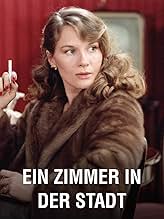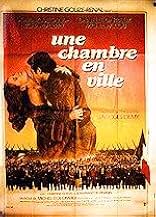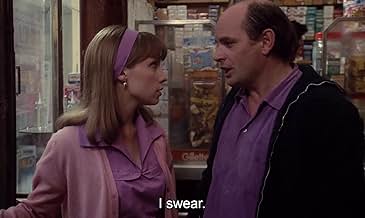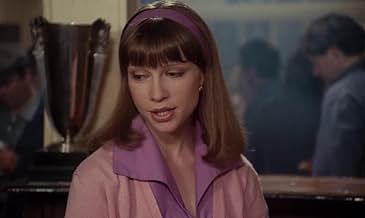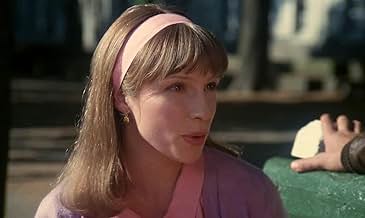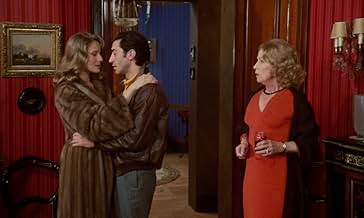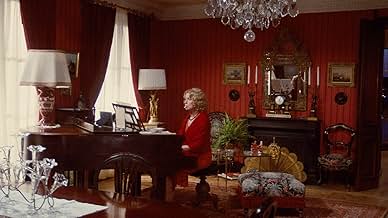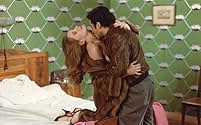AVALIAÇÃO DA IMDb
6,7/10
1,8 mil
SUA AVALIAÇÃO
Adicionar um enredo no seu idiomaAmid an ongoing workers' strike, a steelworker falls in love with the daughter of his baroness landlady, even though both are already in relationships.Amid an ongoing workers' strike, a steelworker falls in love with the daughter of his baroness landlady, even though both are already in relationships.Amid an ongoing workers' strike, a steelworker falls in love with the daughter of his baroness landlady, even though both are already in relationships.
- Prêmios
- 3 vitórias e 10 indicações no total
Florence Davis
- Edith
- (canto)
Avaliações em destaque
6hhg2
I checked out this movie because of Demy's earlier works, Lola (1961), The Umbrellas of Cherbourg (1964), and The Young Girls of Rochefort (1967), all of which I found charming and interesting. Demy has an unmistakable visual sense and makes expressive use of vivid color imagery. All of those films also had playful plot lines that did not always follow logic, order, or even reason. Instead a whimsical, airy feeling often permeated the films.
So, I do not expect, nor demand, that movies have precise plots that always follow order, but Une Chambre really tests that to the limit. The actions of the characters are mystifyingly foolish, as if they were undertaken by five-year-olds, with zero understanding of human emotions or consequences of action. Timelines are compressed beyond belief. This movie makes TV soap operas seem logical, rational, and reasonable! I found myself asking: did that character really do that? Did she really believe that would happen? On what planet might that actually take place.
On the plus side, the singing of dialog was interesting (and was used in his earlier films). The visual style was still strong. However, unless you are a film buff who requires to see all of a director's work, I'd suggest passing on this one. A rating of 6 might be generous, and I wrestled with giving it a 5, but I did like his other films.
So, I do not expect, nor demand, that movies have precise plots that always follow order, but Une Chambre really tests that to the limit. The actions of the characters are mystifyingly foolish, as if they were undertaken by five-year-olds, with zero understanding of human emotions or consequences of action. Timelines are compressed beyond belief. This movie makes TV soap operas seem logical, rational, and reasonable! I found myself asking: did that character really do that? Did she really believe that would happen? On what planet might that actually take place.
On the plus side, the singing of dialog was interesting (and was used in his earlier films). The visual style was still strong. However, unless you are a film buff who requires to see all of a director's work, I'd suggest passing on this one. A rating of 6 might be generous, and I wrestled with giving it a 5, but I did like his other films.
UNE CHAMBRE EN VILLE is much darker and harsher than Demy's more famous films from the 1960s, but it is no less stunning a piece of work. An operatic look at classicism and desire, its peopled by fascinating, layered characters who are sometimes openly unlikable. The music is not at all like Michel Legrand' jazzy, hummable tunes, but this is meant to work within the confines of this grand and melodramatic narrative.
I don't know what it was I expected from this film based on the premise, but by golly, it's not the movie I got. And I am so, so happy about that.
At its core this is a romantic drama set against the backdrop of unrest in Nantes as workers strike and the stooges of the establishment (some euphemistically call them police) enforce state violence. The story is built on very familiar ideas that we've seen in countless other romantic dramas before, and have since, and will again: a troubled landlady, a loveless and even abusive marriage, a relationship on the rocks, external factors adding to hardship, a beleaguered protagonist. That Jacques Demy penned this with a mind for including all this and more inherently places upper limits on suspension of disbelief and fosters the feeling of melodrama. Take into account the fact that one character is wearing nothing but a large overcoat for most of the length (at least twenty-four hours in-universe), the fact that the central romance is the result of a chance encounter and takes the course that it does, and final story beats in the last several minutes that I simply could not believe were actually what Demy consciously selected, and "melodrama" becomes an understatement. The best point of comparison is actually the soap opera, the peak of unending dramatic turns and over the top storytelling (unless you hop over to the next mountain range where Lifetime Original Movies and Horror or Sci-Fi B-Movies claim dominion). And not only is 'Une chambre en ville' a soap opera, but it's one in which every single line of dialogue is sung! It's not even that this adopts the recognizable structure of the average musical or opera, in which dialogue (whether spoken or sung) is interspersed among distinct songs or numbers; rather, this is just a romantic drama in which all lines are sung.
I don't think it's unfair to wonder if this really was exactly what Demy had intended from the get-go, but when you stop to think about it I can't imagine it was anything but. Such as it is the narrative is relatively unsophisticated and straightforward, and this and musical bent definitely amplify the sense of inauthenticity about the whole affair. At the same time, this was built from the ground up with absolute sincerity. The cast give genuinely admirable performances, with Dominique Sanda, Danielle Darrieux, Richard Berry, Jean-Francois Stévenin, and Fabienne Guyon (among others) standing out above even a notable figure like Michel Piccoli. The sets, filming locations, costume design, hair, makeup, stunts, and effects are truly outstanding, as fine as one could hope from most any picture. Though it sticks to the background behind the actors' singing, Michel Colombier's music is easy on the ears; Demy's direction and Jean Penzer's cinematography are rock solid, building shots and scenes with an undeniable expertise. Even for the slant that it ultimately follows, and the inclusion of plot points so tried and true they're basically tropes, Demy's writing - like all else here - could have just as easily been the foundation for an honest, serious drama. And yet all this was instead warped into a cheeky form that practically winks at the audience. There's no reason this should work as well as it does; indeed, I found myself filled with doubts at various points, given the overload of melodrama on hand. Yet as the finale irrevocably affirms how wholeheartedly Demy leaned into the bluster, I'd be plainly lying if I said I wasn't charmed.
'Une chambre en ville' is actually completely outrageous, a concept taken to a ham-fisted extreme that by all reason couldn't and shouldn't hold water. Nevertheless, it's wonderfully well made in every capacity, with the cast and crew having made excellent contributions. And while the overall tack is surely one that inspires love or hate with no middle ground, I for one am totally delighted by the end result. It's definitely a bit of a weird hodgepodge, but even for those who can't abide what Demy is doing here, I don't think there's much arguing that it's entertaining, whether in the best or worst of ways. I find myself conflicted; I don't know if it would be better for potential viewers to be well aware of what they're getting into with this, so as to prepare themselves, or if folks are better off being caught unaware as I was. All I know for sure is that I had a great time watching, and I would happily recommend 'Une chambre en ville' to just about anyone. It's a strange ride in some measure, but one that's very much worth taking.
At its core this is a romantic drama set against the backdrop of unrest in Nantes as workers strike and the stooges of the establishment (some euphemistically call them police) enforce state violence. The story is built on very familiar ideas that we've seen in countless other romantic dramas before, and have since, and will again: a troubled landlady, a loveless and even abusive marriage, a relationship on the rocks, external factors adding to hardship, a beleaguered protagonist. That Jacques Demy penned this with a mind for including all this and more inherently places upper limits on suspension of disbelief and fosters the feeling of melodrama. Take into account the fact that one character is wearing nothing but a large overcoat for most of the length (at least twenty-four hours in-universe), the fact that the central romance is the result of a chance encounter and takes the course that it does, and final story beats in the last several minutes that I simply could not believe were actually what Demy consciously selected, and "melodrama" becomes an understatement. The best point of comparison is actually the soap opera, the peak of unending dramatic turns and over the top storytelling (unless you hop over to the next mountain range where Lifetime Original Movies and Horror or Sci-Fi B-Movies claim dominion). And not only is 'Une chambre en ville' a soap opera, but it's one in which every single line of dialogue is sung! It's not even that this adopts the recognizable structure of the average musical or opera, in which dialogue (whether spoken or sung) is interspersed among distinct songs or numbers; rather, this is just a romantic drama in which all lines are sung.
I don't think it's unfair to wonder if this really was exactly what Demy had intended from the get-go, but when you stop to think about it I can't imagine it was anything but. Such as it is the narrative is relatively unsophisticated and straightforward, and this and musical bent definitely amplify the sense of inauthenticity about the whole affair. At the same time, this was built from the ground up with absolute sincerity. The cast give genuinely admirable performances, with Dominique Sanda, Danielle Darrieux, Richard Berry, Jean-Francois Stévenin, and Fabienne Guyon (among others) standing out above even a notable figure like Michel Piccoli. The sets, filming locations, costume design, hair, makeup, stunts, and effects are truly outstanding, as fine as one could hope from most any picture. Though it sticks to the background behind the actors' singing, Michel Colombier's music is easy on the ears; Demy's direction and Jean Penzer's cinematography are rock solid, building shots and scenes with an undeniable expertise. Even for the slant that it ultimately follows, and the inclusion of plot points so tried and true they're basically tropes, Demy's writing - like all else here - could have just as easily been the foundation for an honest, serious drama. And yet all this was instead warped into a cheeky form that practically winks at the audience. There's no reason this should work as well as it does; indeed, I found myself filled with doubts at various points, given the overload of melodrama on hand. Yet as the finale irrevocably affirms how wholeheartedly Demy leaned into the bluster, I'd be plainly lying if I said I wasn't charmed.
'Une chambre en ville' is actually completely outrageous, a concept taken to a ham-fisted extreme that by all reason couldn't and shouldn't hold water. Nevertheless, it's wonderfully well made in every capacity, with the cast and crew having made excellent contributions. And while the overall tack is surely one that inspires love or hate with no middle ground, I for one am totally delighted by the end result. It's definitely a bit of a weird hodgepodge, but even for those who can't abide what Demy is doing here, I don't think there's much arguing that it's entertaining, whether in the best or worst of ways. I find myself conflicted; I don't know if it would be better for potential viewers to be well aware of what they're getting into with this, so as to prepare themselves, or if folks are better off being caught unaware as I was. All I know for sure is that I had a great time watching, and I would happily recommend 'Une chambre en ville' to just about anyone. It's a strange ride in some measure, but one that's very much worth taking.
How I never saw this movie and when the first line was spoken in singing way, I realize be treat a musical, not a classic musical as we get used to, just sung in every line, well it really weird to watch a movie, I love the ultimate musical "Les Miserables", taking in account the level of the budge they differ each other so much, "Une Chamble en Ville" is a small production a slow pace, sometimes still boring, nevertheless the story is great, the tragic tale took place at Nantes, during shipyard's strike (Which the French people loves to do) a humble worker François (Richard Berry) rent a room from a former Countess Margot (Danielle Darrieux) she has an unsatisfied married daughter Edith (Dominique Sanda in bold nudes scenes) due her husband Edmond (Michel Piccoli) actually is sexually impotent, in other hand François has been dating with Violette, who was pregnancy from him without notice by him, in fact François didn't love her, when he meets Edith the chemistry is overpowering and ends up in love night at cheap hotel, then all these facts are interwoven each other, a tragic tale sang on every line, fine movie, although it wasn't allowed to everyone!!!
Resume:
First watch: 2020 / How many: 1 / Source: DVD / Rating: 7.25
Resume:
First watch: 2020 / How many: 1 / Source: DVD / Rating: 7.25
I always love Demy, except the one discussing the pregnancy of a male-so called a comedy.. Bias, of course. He always give you classical fairy tales which takes you away from your real world. Then you are carried into another space, and you can fully focus on what you are watching. Please don't pause his movies or you'll definitely find them dull and boring! For me, his music strengthens the story. Females are all beautiful princesses or queens. immersed in love, in a way.. Catherine Denver is, of course, his perfect princess. In fact, no one is bad. Many hate his Donkey Skin but that's it's close to Plato's idea/ideal. Most important of all, his protest of war is so subtle that it goes deep down without any noticing...
Você sabia?
- CuriosidadesDemy's longtime collaborator, composer Michel Legrand, strongly opposed the movie's social themes and urged the director to not do the movie. He ended up not being associated with the movie at all, and even in the 2010s, he was still trashing the movie in interviews.
- Erros de gravaçãoAround 01:11:53, Edith is holding a fire gun. Around 01:11:57, Edith is holding her bag and puts a tissue around her hand. However, she hasn't received a razor cut.
- Citações
Madame Pelletier: [singing] You worry too much about me. Think of yourself first, of your own life. I've lived mine.
- ConexõesFeatured in Jacquot de Nantes (1991)
Principais escolhas
Faça login para avaliar e ver a lista de recomendações personalizadas
- How long is A Room in Town?Fornecido pela Alexa
Detalhes
- Data de lançamento
- País de origem
- Idioma
- Também conhecido como
- A Room in Town
- Locações de filme
- Place du Commerce, Nantes, Loire Atlantique, França(Where Violette goes to look for Guilbaud)
- Empresas de produção
- Consulte mais créditos da empresa na IMDbPro
- Tempo de duração1 hora 30 minutos
- Cor
- Mixagem de som
- Proporção
- 1.66 : 1
Contribua para esta página
Sugerir uma alteração ou adicionar conteúdo ausente

Principal brecha
By what name was Um Quarto na Cidade (1982) officially released in Canada in English?
Responda
![Bande-annonce [OV]](https://m.media-amazon.com/images/M/MV5BZGRhNTBmNzItZGNjMS00N2Y4LTkwODgtZjhjNTUxYjBiZmJmXkEyXkFqcGdeQXRyYW5zY29kZS13b3JrZmxvdw@@._V1_QL75_UX500_CR0)
